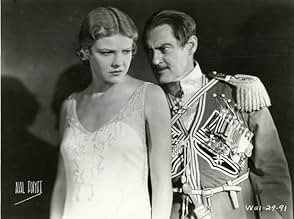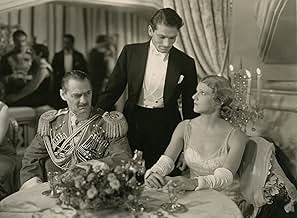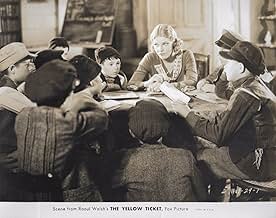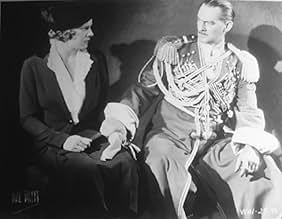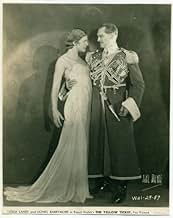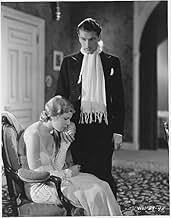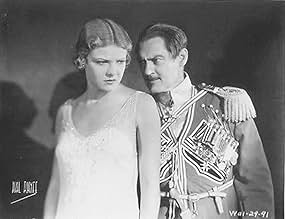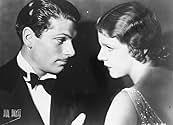Füge eine Handlung in deiner Sprache hinzuA young Russian girl is forced into a life of prostitution in Czarist Russia, and she and a British journalist find their lives endangered when she reveals to him information regarding the s... Alles lesenA young Russian girl is forced into a life of prostitution in Czarist Russia, and she and a British journalist find their lives endangered when she reveals to him information regarding the social crimes rampant in her country.A young Russian girl is forced into a life of prostitution in Czarist Russia, and she and a British journalist find their lives endangered when she reveals to him information regarding the social crimes rampant in her country.
- Regie
- Drehbuch
- Hauptbesetzung
- Auszeichnungen
- 1 Nominierung insgesamt
Oscar Apfel
- British Embassy Butler
- (Nicht genannt)
Frederick Burt
- Minor Role
- (Nicht genannt)
Emile Chautard
- Headwaiter
- (Nicht genannt)
Gilbert Emery
- Sir Hubert, British Ambassador
- (Nicht genannt)
Ruth Feldman
- Woman at Passportcheck
- (Nicht genannt)
Esther Howard
- Prisoner
- (Nicht genannt)
Boris Karloff
- Drunken Orderly
- (Nicht genannt)
Henry Kolker
- Passport Clerk
- (Nicht genannt)
Anne Kunde
- Prison Matron
- (Nicht genannt)
Ivan Linow
- Wrestler
- (Nicht genannt)
Empfohlene Bewertungen
Admittedly, my world history knowledge is lacking, so I was at a bit of a disadvantage watching "The Yellow Ticket." It took place in 1913 Russia and Jews were being persecuted by the Russian government. They were not allowed passports to travel unless you were a woman entertaining men.
Marya Kalish (Elissa Landi) had to get what was called a "yellow ticket" in order to travel to see her father in prison. The yellow ticket indicated that she was a prostitute even though she got her ticket by paying for it, not by becoming a prostitute. It was one more method of demeaning Russian Jews.
She was harassed and harangued throughout her movements throughout Russia. She caught the attention of Baron Igor Andreeff (Lionel Barrymore) the architect behind the yellow tickets. He wanted from her exactly what every other man she came across wanted.
She caught a break when she met a British reporter named Julian Rolfe (Laurence Olivier). He gave her a job as a secretary and kept her from having to be in the Russian streets. He only had positive things to write about Russia until Marya told him of the seedier, corrupt, and oppressive side of Russia.
"The Yellow Ticket" was eye opening and somewhat educational. If I had one complaint, it would be the romantic relationship between Marya and Julian.
I don't have a problem with two people falling in love, but I do think it detracted from the heavier message of the movie--that of Russian oppression of Jews. Marya went from a distressed, marginalized, and mistreated woman to a normal girl in love in short order. She was gaily spending her time with Julian helping him write his articles as though she hadn't a care in the world. It was as if the Jewish oppression ceased to exist, or simply wasn't as important. She was so happy in love I didn't even think she was still on Russian soil! I thought for sure that as merrily as she was working that the threat of her being locked up for helping Julian write disparaging articles didn't exist. When I saw that she was still in Russia I couldn't help but think, "How dumb or suicidal are you?" I figured she and Julian were smart enough to throw stones from a safe distance--like England.
TYT certainly had a good premise even if they veered from it with a love story. I guess in the 30's a man couldn't help a woman out of a jam unless he was in love with her.
Free on YouTube.
Marya Kalish (Elissa Landi) had to get what was called a "yellow ticket" in order to travel to see her father in prison. The yellow ticket indicated that she was a prostitute even though she got her ticket by paying for it, not by becoming a prostitute. It was one more method of demeaning Russian Jews.
She was harassed and harangued throughout her movements throughout Russia. She caught the attention of Baron Igor Andreeff (Lionel Barrymore) the architect behind the yellow tickets. He wanted from her exactly what every other man she came across wanted.
She caught a break when she met a British reporter named Julian Rolfe (Laurence Olivier). He gave her a job as a secretary and kept her from having to be in the Russian streets. He only had positive things to write about Russia until Marya told him of the seedier, corrupt, and oppressive side of Russia.
"The Yellow Ticket" was eye opening and somewhat educational. If I had one complaint, it would be the romantic relationship between Marya and Julian.
I don't have a problem with two people falling in love, but I do think it detracted from the heavier message of the movie--that of Russian oppression of Jews. Marya went from a distressed, marginalized, and mistreated woman to a normal girl in love in short order. She was gaily spending her time with Julian helping him write his articles as though she hadn't a care in the world. It was as if the Jewish oppression ceased to exist, or simply wasn't as important. She was so happy in love I didn't even think she was still on Russian soil! I thought for sure that as merrily as she was working that the threat of her being locked up for helping Julian write disparaging articles didn't exist. When I saw that she was still in Russia I couldn't help but think, "How dumb or suicidal are you?" I figured she and Julian were smart enough to throw stones from a safe distance--like England.
TYT certainly had a good premise even if they veered from it with a love story. I guess in the 30's a man couldn't help a woman out of a jam unless he was in love with her.
Free on YouTube.
Raoul Walksh was never a favourite of mine, I often found his pictures revolting in character and almost inhuman, and this is a particularly disturbing story but the more important for its ruthless realism. It deals with prostitution in tzarist Russia the year before the first world war, it exposes an abyss of social problems and abuse, as the main character Marya Kalish (Elissa Landi) and her family are Jewish and exposed to the tzar's pogroms. Her father ends up in jail and is placed in a dungeon in St. Petersburg, where he gets ill, and the only way for his only daughter to visit him is to acquire a "yellow ticket", a passport for prostitutes, which allows them to go around everywhere, while they have to regularly report to the police. She only avails herself of the ticket to visit her father and never works as a prostitute, although she is troubled enough especially by militaries and Lionel Barrymore as the abominable chief of police. In a critical moment Laurence Olivier as nothing less than a downright Englishman appears as a newspaper man to save her from even worse troubles to come. The finale is tremendous in its chaotic scenes of the outbreak of the war, but it is a good story efficiently told and extremely interesting for its exposure of the conditions of prostitutes in the Russia before the wars, - that only made everything even worse in Russia.
This was the third film in which Lionel Barrymore and Karloff met. This was a big step for Karloff to be appearing with Barrymore, who was a super star in those days along with Laurence Olivier. This film takes place in Russia, in the year 1913, Mary Kalish(Elissa Landi) is a Jewish girl, and finds out that her father is dying in a St. Petersburg prison. During this period, Jews were not able to travel without passports and she has to get a "yellow ticket", which is given to prostitutes. Having arrived at the prison, she learns her father has already passed away. She meets and falls in love with Julian Rolfe (Laurence Olivier), a British newspaperman. Karloff played the role of an alcholic orderly for Lionel Barrymore who attempts to molest Landi in a park. This film story line resembles the Opera "Tosca". This was a good start for Karloff's great career in films.
Another gem I have never heard of. I am also unfamiliar with the talents of Elissa Landi. I am glad to have become acquainted with both!
Landi plays a Jewish woman living in oppressed Russia in 1913. She wants to travel to be with her father who is dying in a prison. But all Jews are being watched and aren't allowed passports to travel. Landi finds out that there is a thing called a "yellow ticket" that is given to prostitutes in order for them to travel freely. So she registers as one, not thinking about any consequences this may have. She gets to the prison too late. Her father has died.
But now that she is "registered" as a prostitute, she can't find work. Her family is informed and they shun her. She can't stay and live where she is, and she can't go home.
Even though she remains "a good girl", all the officers and cads know she has a yellow ticket and assume what she is and expect her to "put out". Barrymore plays a sleazy Czar who makes her life miserable. Finally, Olivier comes along and tries to save her. He is a reporter from London looking for stories on the "real" Russia. She provides lots of information and they end up falling for each other.
Barrymore, however, is out to get her. He wants the bad but true stories in the world's papers about Russia to stop and he knows Landi is behind what Olivier is writing and publishing. He captures Landi and gives her a choice of ending the relationship and her aid to Olivier or be responsible for Olivier's death or give her self over to Barrymore for one disgusting night.
Landi does a great job as the victim being used and torn by society, politics, and the morals of the period. Great job and a very entertaining film.
Be classy and check it out!
Landi plays a Jewish woman living in oppressed Russia in 1913. She wants to travel to be with her father who is dying in a prison. But all Jews are being watched and aren't allowed passports to travel. Landi finds out that there is a thing called a "yellow ticket" that is given to prostitutes in order for them to travel freely. So she registers as one, not thinking about any consequences this may have. She gets to the prison too late. Her father has died.
But now that she is "registered" as a prostitute, she can't find work. Her family is informed and they shun her. She can't stay and live where she is, and she can't go home.
Even though she remains "a good girl", all the officers and cads know she has a yellow ticket and assume what she is and expect her to "put out". Barrymore plays a sleazy Czar who makes her life miserable. Finally, Olivier comes along and tries to save her. He is a reporter from London looking for stories on the "real" Russia. She provides lots of information and they end up falling for each other.
Barrymore, however, is out to get her. He wants the bad but true stories in the world's papers about Russia to stop and he knows Landi is behind what Olivier is writing and publishing. He captures Landi and gives her a choice of ending the relationship and her aid to Olivier or be responsible for Olivier's death or give her self over to Barrymore for one disgusting night.
Landi does a great job as the victim being used and torn by society, politics, and the morals of the period. Great job and a very entertaining film.
Be classy and check it out!
This must have seemed old fashioned even when it was made. The story had to be a holdover from the silent days.
Poor, virtuous peasant Elissa Landi is persecuted by leering aristocrat Lionel Barrymore in pre-revolutionary Russia. Laurence Olivier, in his only his second U.S. movie, is the Western journalist who offers Landi his love and a chance at escape. Boris Karloff plays a drunken orderly.
Whereas Olivier attempts to bring a light touch to his thankless role, neither Landi nor Barrymore seem to know the meaning of the word 'restraint.'. This has an interesting consequence. Whereas Landi is insufferably hysterical, Barrymore provides the best reason to watch; a portrait of sheer, camp villainy that just keeps getting better and better as the film goes on.
Hard to take seriously. Watch it for Barrymore alone.
Poor, virtuous peasant Elissa Landi is persecuted by leering aristocrat Lionel Barrymore in pre-revolutionary Russia. Laurence Olivier, in his only his second U.S. movie, is the Western journalist who offers Landi his love and a chance at escape. Boris Karloff plays a drunken orderly.
Whereas Olivier attempts to bring a light touch to his thankless role, neither Landi nor Barrymore seem to know the meaning of the word 'restraint.'. This has an interesting consequence. Whereas Landi is insufferably hysterical, Barrymore provides the best reason to watch; a portrait of sheer, camp villainy that just keeps getting better and better as the film goes on.
Hard to take seriously. Watch it for Barrymore alone.
Wusstest du schon
- WissenswertesThe film takes place from 1913 to August 4, 1914.
- PatzerThe monoplane which spirits Marya and Rolfe out of Russia is of a much later date than 1914.
- VerbindungenEdited from Die rote Tänzerin von Moskau (1928)
Top-Auswahl
Melde dich zum Bewerten an und greife auf die Watchlist für personalisierte Empfehlungen zu.
Details
- Laufzeit
- 1 Std. 28 Min.(88 min)
- Farbe
Zu dieser Seite beitragen
Bearbeitung vorschlagen oder fehlenden Inhalt hinzufügen

